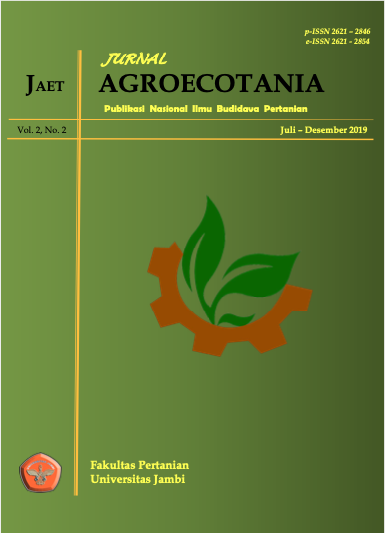Pemanfaatan Fungi Mikoriza Arbuskula Pada Sistem Tumpangsari Kacang Tanah-Padi Gogo Untuk Menstimulir Pertumbuhan Dan Pengendalian Penyakit Blast Pada Padi Gogo Di Desa Saree Kabupaten Aceh Besar
DOI:
https://doi.org/10.22437/agroecotania.v2i2.8741Abstract
Penelitian ini menggunakan rancangan acak kelompok (RAK), perlakuan terdiri dari padi mono kultur, kacang tanah mono kultur, dan tumpang sari padi- kacang tanah. Dosis mikoriza yang digunaka 0 gram pertanaman (0 g.tanaman-1) dan 10 gram pertanaman. Tiap perlakuan diulang sebanyak 4 kali. Pupuk urea, SP36, dan KCL diberikan pada saat tanam dengan cara larikan. Pemeliharaan ,meliputi penyiraman, pengendalian gulma hama tanaman. Peubah yang diamati meliputi : ti9nggi tanaman, jumlah anakan, persentase tanaman terserang, hasil gabah kering padi, dan biji kering kacang tanah. Petak percobaan, yang masing-masing berukuran 4 x 3 meter. Padi gogo varietas Situ Bagendit ditanam dengan jarak tanam 30 x 20 cm pola monokultur, kacang tanah varietas lokal jarak tanam 30 x 20 cm pola monokultur, dan tumpangsari padi gogo- kacang tanah. Aplikasi fungi mikoriza sebanyak 10 g per lubang tanam padi gogo dan kacang tanah pada kedalaman 5 cm, kemudian ditutup dengan tanah. Benih ditanam di atasnya kemudian ditutup lagi dengan tanah. Hasil penelitian menunjukkan bahwa pola tumpang sari padi gogo varietas Situ Bagendit dapat meningkatkan tinggi tanaman padi, jumlah, anakan, menekan perseentase tanaman terserang penyakit blast, dan meningkatkan hasil tanaman padi. Semua variabel itu lebih meningkat lagi dengan pemberian mikoriza, baik pada monokultur maupun pola tumpang sari.
Downloads

Downloads
Published
Versions
- 2020-02-13 (1)
- 2020-02-13 (1)
Issue
Section
License
Please find the rights and licenses in Indonesian EFL Research & Practice.
- License
The non-commercial use of the article will be governed by the Creative Commons Attribution license as currently displayed on Creative Commons Attribution-NonCommercial-ShareAlike 4.0 International License.
- Author’s Warranties
The author warrants that the article is original, written by stated author(s), has not been published before, contains no unlawful statements, does not infringe the rights of others, is subject to copyright that is vested exclusively in the author and free of any third party rights, and that any necessary written permissions to quote from other sources have been obtained by the author(s).
- User Rights
Indonesian EFL Research & Practice's spirit is to disseminate articles published are as free as possible. Under the Creative Commons license, Indonesian EFL Research & Practice permits users to copy, distribute, display, and perform the work for non-commercial purposes only. Users will also need to attribute authors and Indonesian EFL Research & Practice on distributing works in the journal.
- Rights of Authors
Authors retain the following rights:
- Copyright, and other proprietary rights relating to the article, such as patent rights,
- The right to use the substance of the article in future own works, including lectures and books,
- The right to reproduce the article for own purposes, provided the copies are not offered for sale,
- The right to self-archive the article.
- Co-Authorship
If the article was jointly prepared by other authors, the signatory of this form warrants that he/she has been authorized by all co-authors to sign this agreement on their behalf, and agrees to inform his/her co-authors of the terms of this agreement.
- Termination
This agreement can be terminated by the author or Indonesian EFL Research & Practice upon two months’ notice where the other party has materially breached this agreement and failed to remedy such breach within a month of being given the terminating party’s notice requesting such breach to be remedied. No breach or violation of this agreement will cause this agreement or any license granted in it to terminate automatically or affect the definition of Indonesian EFL Research & Practice.
- Royalties
This agreement entitles the author to no royalties or other fees. To such extent as legally permissible, the author waives his or her right to collect royalties relative to the article in respect of any use of the article by Indonesian EFL Research & Practice or its sublicensee.
- Miscellaneous
Indonesian EFL Research & Practice will publish the article (or have it published) in the journal if the article’s editorial process is successfully completed and Indonesian EFL Research & Practice or its sublicensee has become obligated to have the article published. Indonesian EFL Research & Practice may conform the article to a style of punctuation, spelling, capitalization, referencing and usage that it deems appropriate. The author acknowledges that the article may be published so that it will be publicly accessible and such access will be free of charge for the readers.









